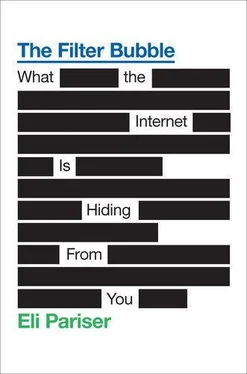198 “some have termed ‘smart dust’”:David Wright, Serge Gutwirth, Michael Friedewald, Yves Punie, and Elena Vildjiounaite, Safeguards in a World of Ambient Intelligence (Berlin/Dordrecht: Springer Science, 2008): abstract.
199 four-year joint effort:Google/Harvard press release. “Digitized Book Project Unveils a Quantitative ‘Cultural Genome,’” accessed Feb. 8, 2011, http://www.seas.harvard.edu/news-events/news-archive/2010/digitized-books.
200 “censorship and propaganda”:Ibid.
200 nearly sixty languages:Google Translate Help Page, accessed Feb. 8, 2011, http://translate.google.com/support/?hl=en.
201 better and better:Nikki Tait, “Google to translate European patent claims,” Financial Times , Nov. 29, 2010, accessed Feb. 9, 2010, www.ft.com/cms/s/0/02f71b76-fbce-11df-b79a-00144feab49a.html.
202 “what to do with them”:Danny Sullivan, phone interview with author, Sept. 10, 2010.
202 “flash crash”:Graham Bowley, “Stock Swing Still Baffles, with an Ominous Tone,” New York Times, Aug. 22, 2010, accessed Feb. 8, 2010, www.nytimes.com/2010/08/23/business/23flash.html.
202 provocative article in Wired :Chris Anderson, “The End of Theory: The Data Deluge Makes the Scientific Method Obsolete,” Wired , June 23, 2008, accessed Feb. 10, 2010, http://www.wired.com/science/discoveries/magazine/16-07/pb_theory.
203 greatest achievement of human technology:Hillis quoted in Jennifer Riskin, Genesis Redux: Essays in the History and Philosophy of Artificial Life (Chicago: University of Chicago Press, 2007), 200.
204 “advertiser-funded media”:Marisol LeBron, “ ‘Migracorridos’: Another Failed Anti-immigration Campaign,” North American Congress of Latin America, Mar. 17, 2009, accessed Dec. 17, 2010, https://nacla.org/node/5625.
205 characters using the companies’ products throughout:Mary McNamara, “Television Review: ‘The Jensen Project,’” Los Angeles Times, July 16, 2010, accessed Dec. 17, 2010, http://articles.latimes.com/2010/jul/16/entertainment/la-et-jensen-project-20100716.
205 product-placement hooks throughout:Jenni Miller, “Hansel and Gretel in 3D? Yeah, Maybe.” Moviefone blog , July 19, 2010, accessed Dec. 17, 2010, http://blog.moviefone.com/2010/07/19/hansel-and-gretel-in-3d-yeah-maybe.
205 the corporate owner of Lipslicks:Motoko Rich, “Product Placement Deals Make Leap from Film to Books,” New York Times, Nov. 9, 2008, accessed Dec. 17, 2010, www.nytimes.com/2008/02/19/arts/19iht-20bookplacement.10177632.html?pagewanted=all.
207 increase “purchase intentions” by 21 percent:John Hauser and Glen Urban, “When to Morph,” Aug. 2010, accessed Dec. 17, 2010, http://web.mit.edu/hauser/www/Papers/Hauser-Urban-Liberali_When_to_Morph_Aug_2010.pdf.
207 “turn it into useful information”:Jane Wardell, “Raytheon Unveils Scorpion Helmet Technology,” Associated Press, July 23, 2010, accessed Dec. 17, 2010 at www.boston.com/business/articles/2010/07/23/raytheon_unveils_scorpion_helmet_technology.
208 “turns the whole world into a display”:Wardell, “Raytheon Unveils Scorpion Helmet Technology.”
208 TV experience overlaid on a real game:Michael Schmidt, “To Pack a Stadium, Provide Video Better Than TV,” New York Times, July 28, 2010, accessed Dec. 17, 2010, www.nytimes.com/2010/07/29/sports/football/29stadium.html?_r=1.
208 AugCog, which uses cognitive neuroscience:Augmented Cognition International Society Web site, accessed Dec. 17, 2010, www.augmentedcognition.org.
209 500 percent increase in working memory:“Computers That Read Your Mind,” Economist, Sept. 21, 2006, accessed Dec. 17, 2010, www.economist.com/node/7904258?story_id=7904258.
209 at least sixteen different ways:Gary Hayes, “16 Top Augmented Reality Business Models,” Personalize Media (Gary Hayes’s blog), Sept. 14, 2009, accessed Dec. 17, 2010, www.personalizemedia.com/16-top-augmented-reality-business-models.
210 solve problems for people:Chris Coyne, interview with author, New York, NY, Oct. 6, 2010.
211 “reality” is “one of the few words”:Vladimir Nabokov, Lolita (New York: Random House, 1997), 312.
213 powering the marketing campaigns:David Wright et al., Safeguards in a World of Ambient Intelligence (London: Springer, 2008), 66, accessed through Google eBooks, Feb. 8, 2011.
214 “machines make more of their decisions”:Bill Joy, “Why the Future Doesn’t Need Us,” Wired (Apr. 2000) accessed Dec. 17, 2010, www.wired.com/wired/archive/8.04/joy.html.
Chapter Eight: Escape from the City of Ghettos
217 “the nature of his own person”:Christopher Alexander et al., A Pattern Language (New York: Oxford University Press, 1977), 8.
217 “Long Live the Web” Sir Tim Berners-Lee, “Long Live the Web:A Call for Continued Open Standards and Neutrality,” Scientific American , Nov. 22, 2010.
219 “need to address the core issues”:Bill Joy, phone interview with author, Oct. 1 2010.
220 ideal nook for kids:Alexander et al., A Pattern Language , 445, 928–29.
220 “distinct pattern language”:Ibid., xvi.
220 “city of ghettos”:Ibid., 41–43.
221 “dampens all significant variety”:Ibid., 43.
221 “move easily from one to another”:Ibid., 48.
221 “support for his idiosyncrasies”:Ibid.
222 “psychological equivalent of obesity”:danah boyd. “Streams of Content, Limited Attention: The Flow of Information through Social Media,” Web2.0 Expo. New York, NY: Nov. 17, 2007, accessed July 19, 2008, www.danah.org/papers/talks/Web2Expo.html.
223 how to build a better mousetrap:“A Better Mousetrap,” This American Life no. 366, aired Oct. 10, 2008, www.thisamericanlife.org/radio-archives/episode/366/a-better-mousetrap-2008.
223 you’ll catch your mouse:Ibid.
223 “jumping out of that recursion loop”:Matt Cohler, phone interview with author, Nov. 23, 2010.
226 organ donation rates in different European countries:Dan Ariely as quoted in Lisa Wade, “Decision Making and the Options We’re Offered,” Sociological Images blog, Feb. 17, 2010, accessed Dec. 17, 2010, http://thesocietypages.org/socimages/2010/02/17/decision-making-and-the-options-were-offered/.
229 “only when regulation is transparent”:Lawrence Lessig, Code (New York: Basic Books, 2006), 260, http://books.google.com/books?id=lmXIMZiU8yQC&pg=PA260&lpg=PA260&dq=lessig+political+response+transparent+code&source=bl&ots=wR0WRuJ61u&sig=iSIiM0pnEaf-o5VPvtGcgXXEeL8&hl=en&ei=1bI0TfykGsH38Ab7-tDJCA&sa=X&oi=book_result&ct=result&resnum=1&ved=0CBcQ6AEwAA#v=onepage&q&f=false.
230 “one of the world’s worst kept secrets”:Amit Singhal, “Is Google a Monopolist? A Debate,” Opinion Journal, Wall Street Journal, Sept. 17, 2010, http://online.wsj.com/article/SB10001424052748703466704575489582364177978.html?mod=googlenews_wsj#U301271935944OEB.
231 “honest and objective about ourselves”:“Philip Foisie’s memos to the management of the Washington Post ,” Nov. 10, 1969, accessed Dec. 20, 2010, http://newsombudsmen.org/articles/origins/article-1-mcgee.
Читать дальше











